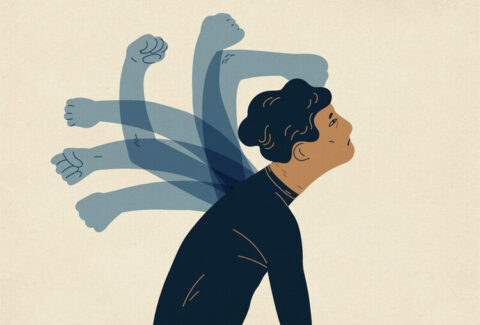The Forgiveness Exercise
The Forgiveness Exercise
The ripple effect on health, happiness, and well-being.
This article was first published in Psychology Today
Forgiveness is defined as the intentional and voluntary process by which someone undergoes a change in feelings and attitude regarding a perceived offense. This process also entails the overcoming of unhelpful emotions, such as resentment and vengeance, however, justified they might be. [1]
The benefits of forgiveness have been studied in medicine and social sciences. For example, researchers at the University of Wisconsin developed a 20-Step Process Model of Forgiveness [2] following a longitudinal study that showed that people who are generally more affected by neurosis, anger, and hostility were less likely to forgive another person even after a long time had passed.
Studies also show that those who forgive are happier and healthier than those who hold resentments. For example, some studies show improved functioning in cardiovascular and nervous systems for those who thought about forgiving, and those who were more forgiving were less likely to suffer from a wide range of illnesses. Needless to say, the less forgiving individuals reported a higher number of health conditions.
And studies done at Stanford University show that forgiveness [3] can be taught and learned as a skill and that those who have learned to forgive become less angry, feel less hurt, and are generally more optimistic. Further, with forgiveness one is found to become compassionate, more self-confident, and less likely to experience stress, and will have increased vitality.
Despite the power behind the process of forgiveness, many either don’t practice it or don’t practice it well. One optimal place to start, however, is to understand that the process of forgiving someone else entails starting by forgiving ourselves. This, therefore, means that the process of forgiveness entails an inside-out and not an outside-in approach.
Studies show that anything done to promote forgiveness has no impact unless we think emotionally and experience the process by making forgiveness of the self, of others, and things, a way of life that is habitual and natural, through practice.
As a result, learning to forgive can be quite a challenge for all of us, and additional factors that explain that are as follows:
- The system-based thinking we’ve all been raised with is Illusion-Based.
- We’ve been wired for Illusion-Based Thinking, which means our default thinking is through the lens of the past.
- Perceiving through the lens of the past brings fear and attack thoughts. It brings projection, further fear, retaliation, and further attacks. And the cycle continues, which leads us further away from forgiveness.
The above three mechanisms explain why it is such a challenge to get to forgiveness and why forgiveness is impossible to get to as long as we continue to run our lives on Illusion-Based Thinking. As Albert Einstein said, “We cannot solve our problems with the same thinking we used when we created them.”
To truly and fully forgive then, entails a shift from Illusion-Based Thinking to Reality-Based Thinking; a shift to understanding that we live in a world of projection and that our inability to forgive is nothing less than a reminder, sign, and an invitation to, forgive ourselves fully and truly.
In Reality-Based Thinking, forgiveness allows us to fulfill our shared function of modeling, a function we are currently unconsciously fulfilling in ways that are not always beneficial to ourselves, others, and the world. Now, given that our authentic happiness, fulfillment, and authentic success are dependent upon our ability to fulfill our function, and, given that forgiveness is part of fulfilling our function, it seems to be clear that our authentic happiness is tightly tied to our ability to forgive.
Now, given the essential nature of the practice of forgiveness, we will all agree that we cannot delay any further. Here’s what we can do right now and what we can also help our loved ones and our patients and clients start doing right away.
- Stand in front of a mirror.
- Look in your eyes for 30 seconds.
- Say your name, followed by “I forgive you.” And repeat this at least 10 times.
- Then say your name, followed by “I forgive you for…” and fill in the blank. Do so at least three times, with a new fill in the blank item, each time.
- Stay in front of the mirror for a few seconds to observe how you’re feeling overall, including in your body. And commit to this exercise every day, for at least one month, and be ready to share how much it will have changed your life because it has to.
There are several reasons why this forgiveness exercise is so powerful. Let us mention just a few:
- It automatically starts removing unconscious blocks we have for self-love, for our sense of worthiness, and for our self-confidence.
- It starts to wash away self-hatred, any sense of worthlessness, and any low sense of self in general.
- It starts to give us a sense of freedom, allowing us to slowly but surely put down our heavy bag of the past, which then allows us to live and make more conscious decisions in the present.
- It allows us to start using a different template for our future.
- It helps us start developing a different relationship with our incessant thinking or mental chatter, which then helps decrease symptoms of depression, anxiety, and even trauma.
- It starts to give us a taste of what it means to start living in Reality-Based Thinking, which will help expand our consciousness to make this shift from Illusion-Based Thinking to Reality-Based Thinking.
Do you not find it is worth it? Are you willing to at least start doing this exercise?
You will be glad you did.
We thank you for being part of this journey to help cease suffering for our patients and clients, for our loved ones, for the world, starting with us.
References
[1] “Forgiveness.” Wikipedia, Wikimedia Foundation, 2 Feb. 2021.
[2] “How to Forgive.” Need To Forgive Forgiveness Institute Benefits of Forgiving How to Forgive.
[3] Stanford Medicine.






